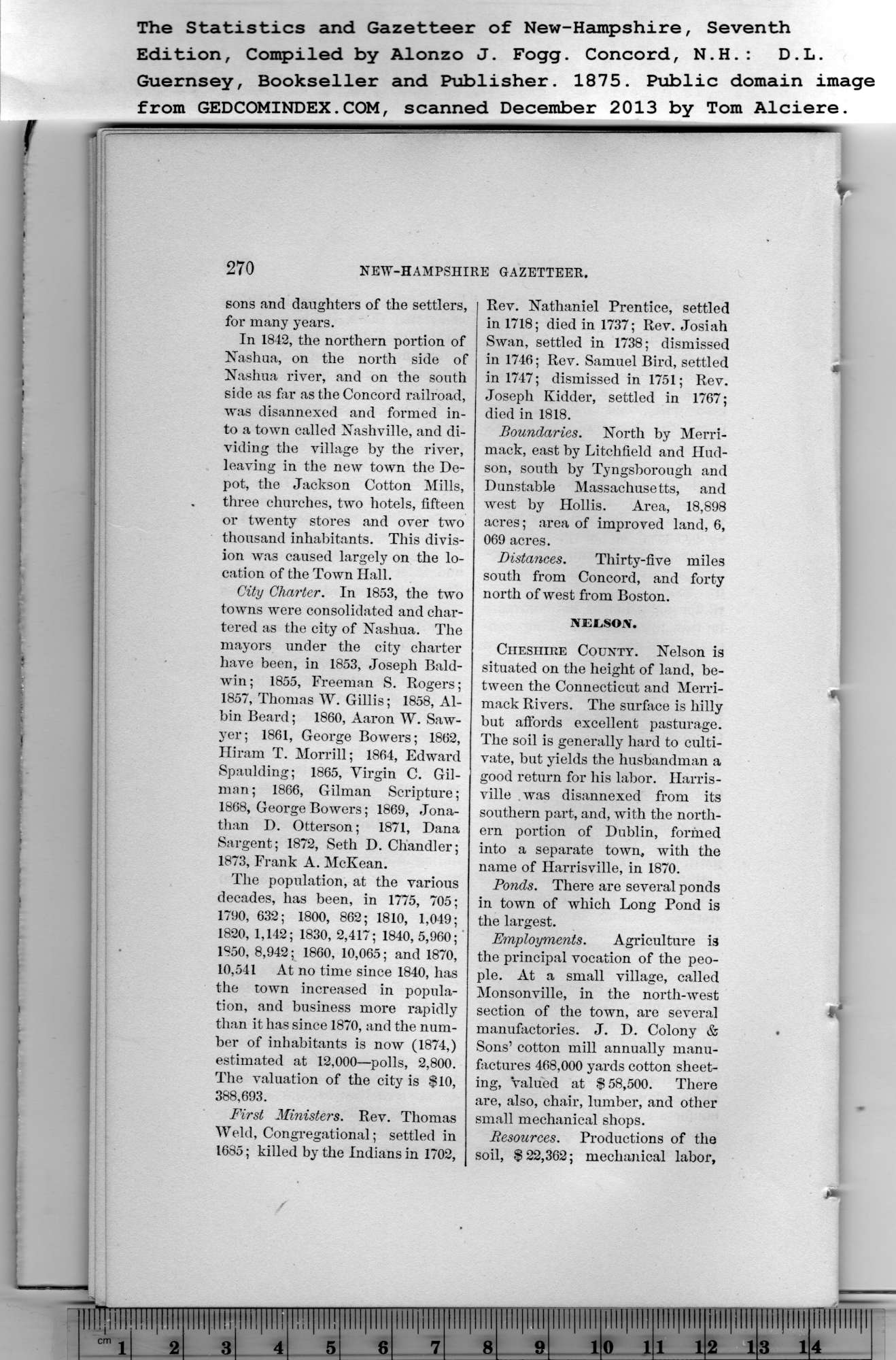|
sons and daughters of the settlers,
for many years.
The Statistics and Gazetteer of New-Hampshire, Seventh
Edition, Compiled by Alonzo J. Fogg. Concord, N.H.: D.L.
270 NEW-HAMPSHIRE GAZETTEER.
In 1842, the northern portion of
Nashua, on the north side of
Nashua river, and on the south
side as far as the Concord railroad,
was disannexed and formed in-
to a town called Nashville, and di-
viding the village by the river,
leaving in the new town the De-
pot, the Jackson Cotton Mills,
three churches, two hotels, fifteen
or twenty stores and over two
thousand inhabitants. This divis-
ion was caused largely on the lo-
cation of the Town Hall.
City Charter. In 1853, the two
towns were consolidated and char-
tered as the city of Nashua. The
mayors under the city charter
have been, in 1853, Joseph Bald-
win ; 1855, Freeman S. Rogers;
1857, Thomas W. Gillis; 1858, Al-
bin Beard; 1860, Aaron W. Saw-
yer; 1861, George Bowers; 1862,
Hiram T. Morrill; 1864, Edward
Spaulding; 1865, Virgin C. Gil-
man; 1866, Gilman Scripture;
1868, George Bowers; 1869, Jona-
than D. Otterson; 1871, Dana
Sargent; 1872, Seth D. Chandler;
1873, Frank A. McKean.
The population, at the various
decades, has been, in 1775, 705;
1790, 632; 1800, 862; 1810, 1,049;
1820, 1,142; 1830, 2,417; 1840, 5,960;
1850, 8,942; 1860, 10,065; and 1870,
10,541 At no time since 1840, has
the town increased in popula-
tion, and business more rapidly
than it has since 1870, and the num-
ber of inhabitants is now (1874,)
estimated at 12,000—polls, 2,800.
The valuation of the city is $10,
388,693.
First Ministers. Rev. Thomas
Weld, Congregational; settled in
1685; killed by the Indians in 1702, |
Rev. Nathaniel Prentice, settled
in 1718; died in 1737; Rev. Josiah
Swan, settled in 1738; dismissed
in 1746; Rev. Samuel Bird, settled
in 1747; dismissed in 1751; Rev.
Joseph Kidder, settled in 1767;
died in 1818.
Boundaries. North by Merri-
mack, east by Litchfield and Hud-
son, south by Tyngsborough and
Dunstable Massachusetts, and
west by Hollis. Area, 18,898
acres; area of improved land, 6,
069 acres.
Distances. Thirty-five miles
south from Concord, and forty
north of west from Boston.
NELSON.
Cheshire County. Nelson is
situated on the height of land, be-
tween the Connecticut and Merri-
mack Rivers. The surface is hilly
but affords excellent pasturage.
The soil is generally hard to culti-
vate, but yields the husbandman a
good return for his labor. Harris-
ville was disannexed from its
southern part, and, with the north-
ern portion of Dublin, formed
into a separate town, with the
name of Harrisville, in 1870.
Ponds. There are several ponds
in town of which Long Pond is
the largest.
Employments. Agriculture i3
the principal vocation of the peo-
ple. At a small village, called
Monsonville, in the north-west
section of the town, are several
manufactories. J. D. Colony &
Sons’ cotton mill annually manu-
factures 468,000 yards cotton sheet-
ing, valued at $58,500. There
are, also, chair, lumber, and other
small mechanical shops.
Resources. Productions of the
soil, $22,362; mechanical labor, |
